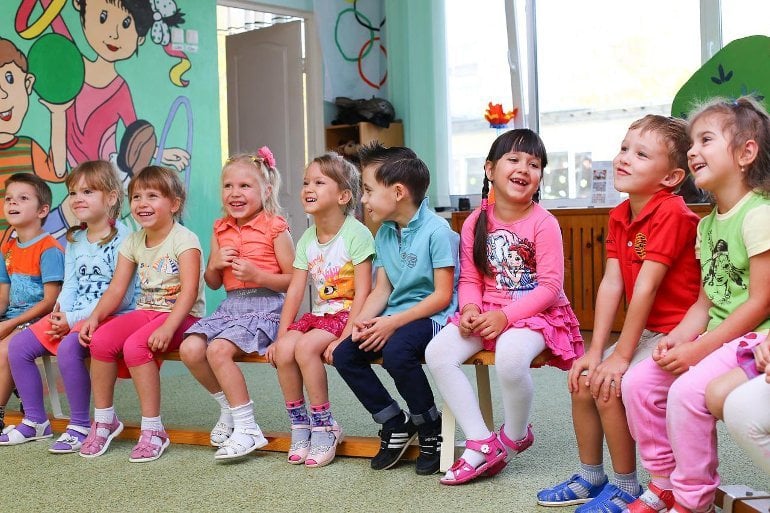Summary: Pre-school-aged children with better vocabulary and attention skills before they begin school are more likely to perform better in an educational setting than their peers with less well-developed vocabulary and attention skills.
Source: Taylor & Francis Group
Children who enter preschool with good vocabulary and attention skills do better in class, according to a study published in the peer-reviewed journal Early Education and Development.
The findings based on 900 four-year-olds from eight US states show how a child’s ability to engage with teachers and peers is affected by the range of words they know.
The results also show that young children are more likely to get involved with classroom tasks if they have learned how to suppress inappropriate behavior and block out distracting thoughts and feelings.
“This study demonstrated that the levels of vocabulary skills and inhibitory control that children exhibit in the fall (autumn) of the preschool years matter for their classroom engagement in different ways,” says lead author Qingqing Yang from The Ohio State University, Columbus, US.
“Children with lower inhibitory control and vocabulary skills appear to be at risk of displaying different kinds of non-engaging behaviors.
“This suggests that teachers need to be able to recognize who may be susceptible to more negative engagement. They also need to facilitate classroom engagement for all children.
“Given the large amount of time that children spend in the classroom, these findings have implications for optimizing children’s vocabulary and inhibitory control development.”
Preschool is defined as the years of informal education before primary school. Studies have shown that a child’s vocabulary skills during this time are critical for later academic success.
Also key is inhibitory control which is the ability to override the natural human response to distractions or stimulus and instead focus on achieving goals or tasks.
For this study, a total of 895 preschool children – including 443 girls and 452 boys – were recruited from diverse race and ethnic backgrounds, across 223 classrooms in 10 locations.
The researchers assessed them when they started preschool in the fall and then again the following spring.
To calculate skill levels, the researchers used several measures including the pencil tap test. This was used to assess inhibitory control – the child was instructed to tap once when the assessor tapped twice and vice versa.
For vocabulary, children were asked to name objects in pictures; and assessors rated classroom engagement with teachers, peers and tasks by spending 4 hours approx. observing each child individually.
Positive classroom engagement included sociability, communication, and self-reliance with tasks; and negative included conflict with teachers and peers as well as off-task behaviors.

Results showed that children with stronger vocabulary skills at the start of the preschool year displayed more positive engagement with both their teachers and peers.
In addition, those with better inhibitory control had more positive engagement with tasks and less negative interaction in the classroom.
Conversely, the study suggests that negative engagement in the classroom shapes vocabulary learning. It creates the link between weak inhibitory control among children in the fall and poor skills in vocabulary and inhibitory control in the spring.
The authors say their findings are an important step forward given that ‘a small change in children’s skills and experiences’ early on can ‘improve or impair’ their chance of academic success long-term.
Potential implications for policymakers to consider, the authors report, include a need for better teacher training in order for them to identify, earlier on, at-risk pupils who lack these skills and provide the right support.
This could help children who have lower levels of inhibitory control and weaker vocabulary to thrive better once they enter formal education.
About this neurodevelopment research news
Author: Simon Wesson
Source: Taylor & Francis Group
Contact: Simon Wesson – Taylor & Francis Group
Image: The image is in the public domain
Original Research: Closed access.
“Preschoolers’ vocabulary skills and inhibitory control: The role of classroom engagement” by Qingqing Yang et al. Early Education and Development
Abstract
Preschoolers’ vocabulary skills and inhibitory control: The role of classroom engagement
Research Findings: Preschoolers’ vocabulary skills and inhibitory control have been demonstrated critical for later school success; however, the ways in which the individual classroom experiences dynamically interchange with these skills is still unclear. In this paper, we examine the role of children’s individual engagement with teachers, peers, and tasks in facilitating children’s skill development across the school year.
Using a sample of 895 preschoolers across 223 classrooms drawn from the Professional Development Study, the current study examined engagement as both outcomes of children’s vocabulary and inhibitory control in the fall of the preschool year and as mediators of linkages between them across the preschool year.
Results suggested that vocabulary skills and inhibitory control each shape different aspects of classroom engagement.
Children’s vocabulary was associated with positive engagement with teachers and peers, whereas inhibitory control was associated with positive task engagement and negative engagement.
We also found that negative engagement as composited by conflicts with teachers and peers and off-task behaviors mediated the association between fall inhibitory control with spring vocabulary and inhibitory control.
Practice or Policy: Together, these findings suggest the critical role of individual classroom experiences in explaining children’s vocabulary and inhibitory control development.







